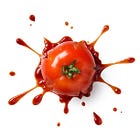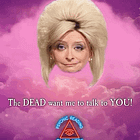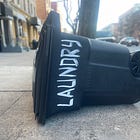🙏 Why aren't you enlightened yet?
“In the awakening of the heart there is no such thing as enlightened retirement. That is not how it happens to us. We all know that after the honeymoon comes the marriage, after the election comes the hard task of governance. In spiritual life it is the same: After the ecstacy comes the laundry.”
—Jack Kornfield, After the Ecstasy, the Laundry
“Why aren’t you enlightened yet?” (W.A.Y.E.Y.) snaps the most vocal member of my Inner Critic Committee (ICC), an extension of my long-time Personal Development Police (PDP).
Both crews have hovered over my writing since my twenties, a few years after I started my first website in 2005 at the ripe ol’ age of twenty-two. A few years in, I started experimenting with more vulnerable, personal posts, rather than just posting the distant, more clinical advice missives on adulting.
Every single time I was afraid to hit publish, those would end up becoming the most popular posts, the ones people came out of the internet woodwork to thank me for.
Doing this repeatedly, against an instinct to stay quiet, taught me something: my inner critic is not always correct, and writing from a high horse of 24/7 enlightenment is impossible (lolol that I even imagine that being an option).
This critic wears loose white linen, of course. She can handle crème-on-crème like the responsible, enlightened adult she is. She is older, wiser, and tired of my silly antics. She lives in a monastery, yet takes a detailed interest in what I’m about to post here. It’s like she’s trying to save me from myself (a gesture I understand and appreciate).
Except that she keeps insisting on taking over the role of Idea Editor here at Doh. That means the moment I come up with an idea for a post teasing out the nuances of fear and self-doubt inherent in a creative career, she immediately shoots it down.
What’s wrong with you?! she asks, exasperated. Why haven’t you figured this out yet? Her mascot is an eye-roll.
For a moment, I pause to consider her rhetorical questions, and then . . . silence. I entertain thoughts of never posting here again; what’s the point? I should be enlightened by now. I know better, so why give in to the temptation to roll around in the dirt of self-doubt?
Maybe it’s a product of reading so many spiritual and self-help books in my twenties and early thirties—we’re talking hundreds. I was obsessed with overcoming the anxiety and insecurity churning through my psyche, and they did work.
Now, decades later, my mind knows what enlightenment sounds like, and my body-and-soul have once or twice experienced all-encompassing waves of transcendent peace-love-bliss washing over. I know that suffering is arguing with reality, and that, as Byron Katie says, “reality wins, but only ever one hundred percent of the time.”
Maybe that’s why I have so much fun teasing out the nuances of reality here. Unwavering happiness-positivity-spiritual-bypassing doesn’t feel like reality to me.
It’s cathartic for me (and hopefully comforting and entertaining for you) not to pretend to be enlightened all the time—or ever. If I were, I’d be Eckhart Tolle, dispensing sage wisdom from his sacred bench—but I wouldn’t be writing personal essays. I frequently have to remind my WAYEY inner critic of this.
As Phillip Lopate explains in the introduction to his compendium, The Art of the Personal Essay:
“The struggle for honesty is central to the ethos of the personal essay. ‘I want to be an honest man and a good writer,’ James Baldwin put it, in that order. Yet the personal essayist often admits that few of us can remain honest for long, since humans are incorrigibly self-deceiving, rationalizing animals. Ironically, it is this skepticism that uniquely equips the personal essayist for the difficult climb into honesty.
. . . Personal essayists are adept at interrogating their ignorance. Just as often as they tell us what they know, they ask at the beginning of an exploration of a problem what it is they don’t know—and why. They follow the clue of their ignorance through the maze.”
It is often the case that, thanks to my very vocal WAYEY critic, as I am drafting a post here, I fast forward thirty years—sometimes only five or ten—and I am already embarrassed for the younger me, writing here, now. Cringe. I’ll be so much wiser then. Maybe it’s best to pipe down now; stay quiet, and save myself the embarrassment. These trifling concerns will vanish. Why give them any air time?
My friend reflected on something helpful the other day, putting better words than I could to what I am trying to do here. “Doh is not about being negative,” she said, “It’s about normalizing the struggle that most people hide.”
As I share in the conclusion of Free Time, “There is a reason renowned meditation teacher Jack Kornfield wrote a book called After the Ecstasy, The Laundry, interviewing over one hundred spiritual leaders on the challenges of returning to ‘householder’ life.”
Householder life—as opposed to the pristine, untouched order of an imagined monastery—is inherently messy, as is the journey of entrepreneurship. Admitting and exploring that here on Doh has been so much more fun than pretending otherwise.
So, no, I am not enlightened yet. If that bothers you—as it does my Inner Critic Committee—with all due respect, you have full permission not to continue reading.1
❤️
If you enjoyed this post, you might also appreciate:












I so appreciate your humility, it is a wonderful antidote to the arrogance that can flow from moments of enlightenment. I've experienced that so many times myself - a sudden feeling of clarity that my ego all too eagerly equates with closure. And then a new version of the same issue circles back again and I get the chance to rediscover the virtues of modesty.
For what it's worth - to me, Doh doesn't reveal a secret struggle, it reveals the beauty of an expanding emotional awareness. Love you!
Your friend Julie is 100% correct: "Doh is not about being negative,” she said, “It’s about normalizing the struggle that most people hide." Wow. The world would be a better place if we spent more time normalizing our struggles. Rather than pretending we have it all together and belittling others that they don't have it together. (when none of us do--<eye-roll>)